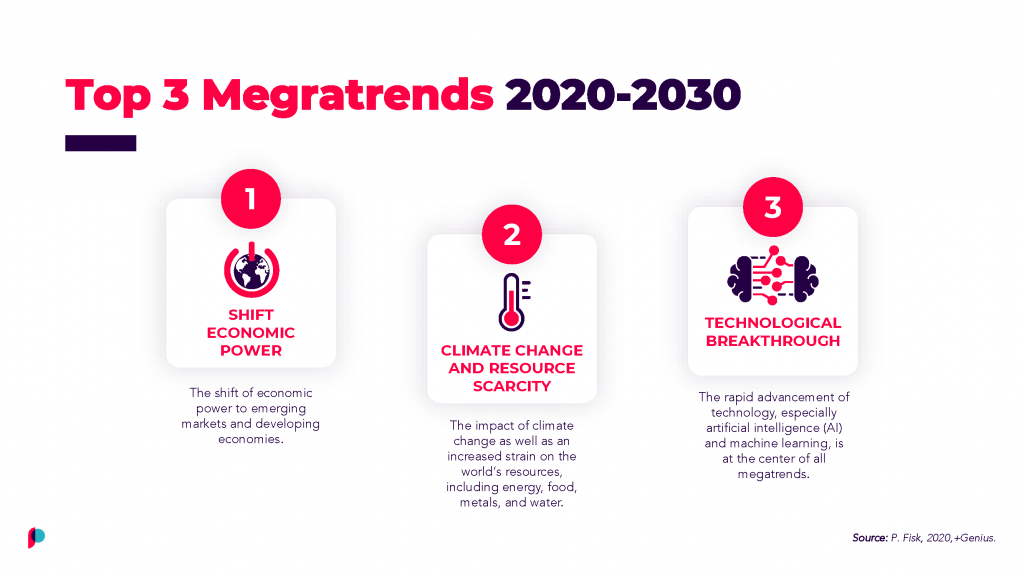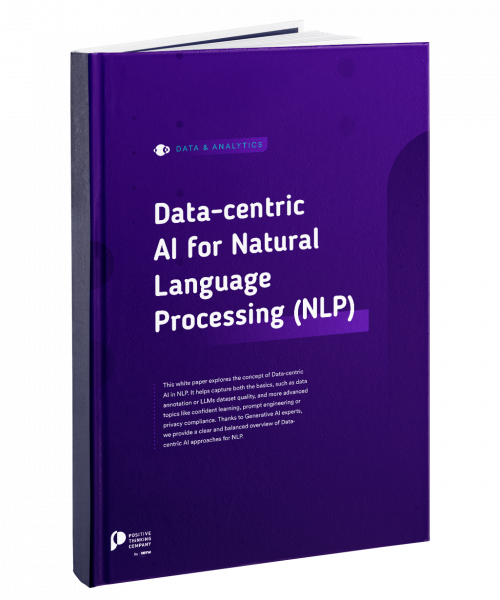Climate change and the huge amount of data produced every day have a high chance to be the main drivers of our economy and private lives in the next years. Both create new opportunities, threats, and needs for business evolution and modern, smart business models.

On the one hand, there is a (very) urgent need to innovate in a way that is mitigating climate change and associated environmental and social threats. Our earth’s average temperature has already risen by 1.1 °C, and the negative effects of climate change are already visible today – often felt most by those who contributed less. To avoid and reduce greenhouse gas emissions, renewable energy, a cautious usage of scarce resources and energy efficiency represent key levers. Therefore, companies and organizations need to adapt and play an active role in developing new sustainable technologies and business models to keep global warming below 1.5°C.
Data, on the other hand, is the foundation and currency of our modern digital world. It is driving innovation in technology, business, and society by supporting decision-making and improving efficiency. A wide range of opportunities can be pursued to create value for people and the economy. Data and AI-driven applications are already leveraged to e.g. detect and diagnose diseases earlier, improve farming practices or create more efficient and effective transportation systems
Both topics have the power to transform our economy in multiple ways. What if we think them together? What if we use their transformational power to shape our economy in a data-driven way and meet the goal of sustainable value creation?
At Positive Thinking Company, and especially within the ‘Sustainability x Data Products’ innovation team, we think it’s the perfect match – let us explain why. But first, let’s set a common ground.
What do we actually mean by ‘Sustainability and Data Products’?
By default, sustainability is often associated with its environmental dimension which focuses on staying within the planetary boundaries. But this is not the only dimension of sustainability, the two others being social sustainability and economical sustainability. Social sustainability concentrates on the integrity of humans and takes aspects like diversity, equality, and health into account. Economical sustainability focuses on maintaining the current prosperity for future generations and innovating technology in a useful and humanity-supporting way. All three dimensions are interconnected and important to consider while ensuring a holistic perspective on sustainability.
A Data Product, in turn, is everything that generates added value for end users from (raw) data, as Caroline Kleist, our Head of Data & Analytics, stated in a dedicated blog post. For the users, it does not matter if there is business intelligence or AI methods behind a specific functionality of a data product. It is essential though that the product solves their problem or creates a benefit for them.
By now you wonder what these two can have in common, right? Let’s have a look.
What do Sustainability and Data Products have in common?
As we stated above, the first thing that unites sustainability and data products is of course their massive importance. They are essential components for businesses to evolve in the modern economy, in a more pertinent manner.
Sustainability and data products require deep expertise in their respective domains. Nowadays, using data to drive some decisions or fuel a dashboard is quite common. But calling an organization ‘data-driven’ is not. It takes a lot of expertise and experience. Similarly, to ensure that sustainability practices are effective and efficient, it is important to have deep knowledge and practice in several domains. A lot of expertise and out-of-the-box thinking is needed to redefine the general way how we do our business in a more relevant, efficient, and sustainable way.
Another common ground is the fact that everybody talks about it, but very few companies have succeeded in wrapping their head around it and really started implementing. Some are somehow stuck in the experimentation phase while others do not really know how to get the energy on the street.
As stated above, both topics have huge transformational power and need a holistic approach. Decisions and interventions can have positive and negative consequences on various levels. You need to have a look at the entire ecosystem to understand what can be truly meaningful actions. Therefore, it is important to involve, besides experts, all the stakeholders and foster cultural change.
To actually get started, both topics need major time and money investments. But in the long run, both show the potential to result in added value and cost savings over time. It’s a strategic decision that promises a large return on investments (ROI).
On top of the quantifiable benefits of investing in sustainability and data products, there are a few soft factors that have a positive impact: Sustainability as well as the transformation towards a data-driven organization attract young, well-educated, and motivated talents that want to find purpose and inspiration in their jobs. Besides, the general reputation of companies investing in both fields is better and results in increased interest from investors and potential customers.
But let’s be honest, sustainability and data products do not always go hand in hand.
What are the challenges on the way to unite them?
Technology and therefore data products need hardware whose production generates emissions. Keeping up with sustainability standards within the supply chain is a major challenge to make the development of data products sustainable.
The implementation and usage of data products need computing power and thus also result in direct emissions during the whole lifecycle. Depending on the locality of servers, this is more or less harmful to the environment, depending on the country’s energy mix. Not to mention the recent prediction from Gartner, “By 2025, AI will consume more energy than the human workforce”.
Decisions that are data-driven always have the risk of being influenced by biases that lay within the raw data. Discrimination of minority groups will result in unfair models and predictions, finally leading to decisions that suffer fairness problems.
To use data to their full potential data literacy is needed. The knowledge required to handle data products can lead to socially excluded groups because they are lacking the ability to get educated on data and its usage.
And finally, there is always a risk that data is misused, resulting in threats to people and the environment. Regulations like the EU AI Act will help to reduce this threat but it’s always important to keep this in mind while developing data products.
Thinking Sustainability and Data Products together will result in a data-driven sustainability approach
The challenges make clear that by focusing (only) on data you might contradict the sustainability of your actions and your business model. However, by looking at the shared aspects of the transformation towards a more sustainable and more data-driven economy you quickly see that it can be very beneficial to think them together.
Data can be a powerful vehicle to faster reach your sustainability targets – making sure that you understand the footprint of your business processes better. It supports your decision-making with found information about their direct or indirect sustainable impact. On top, smartly designed data products can have a positive sustainable impact. Raising awareness about their lifecycle will improve their responsible usage.
For us, all this makes it even more relevant to approach them both together. Only with a common perspective, you make sure to successfully achieve both transformations and become a sustainable and data-driven organization in the long run.












